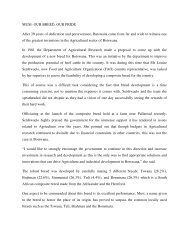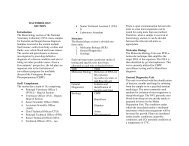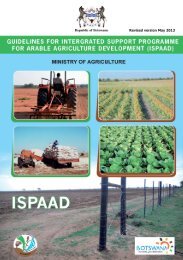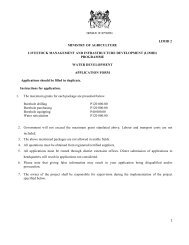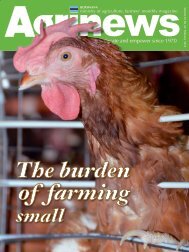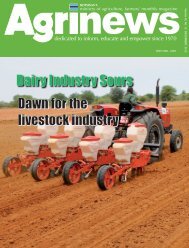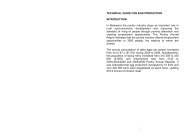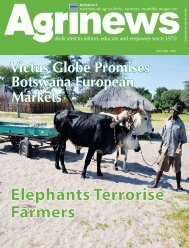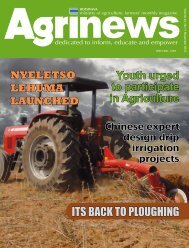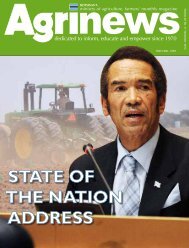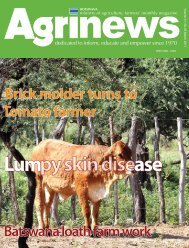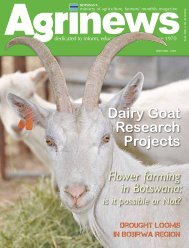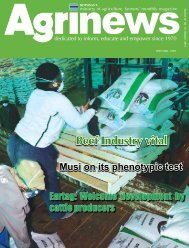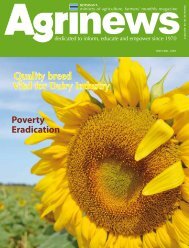GHANZI SHOW - Ministry of Agriculture
GHANZI SHOW - Ministry of Agriculture
GHANZI SHOW - Ministry of Agriculture
Create successful ePaper yourself
Turn your PDF publications into a flip-book with our unique Google optimized e-Paper software.
Kruger,Mokalake, Kgosi Baniki and Molebatsi<br />
admiring one <strong>of</strong> the exhibits<br />
“We see their crop when it is planted<br />
and it compares extremely well with<br />
those <strong>of</strong> commercial farmers, but then<br />
all <strong>of</strong> a sudden it fades away because <strong>of</strong><br />
insects as these crops are not sprayed.”<br />
Kruger said the current ISPAAD<br />
package is good and a commendable<br />
effort by government ,but he termed it<br />
‘half package.’ He, therefore, advised<br />
that it should be made ‘full package’ to<br />
support the efforts <strong>of</strong> small scale farmers<br />
who are currently healing wounds <strong>of</strong><br />
drought <strong>of</strong> the previous planting season.<br />
The Minister <strong>of</strong> Lands and Housing, Mr<br />
Lebonaamang Mokalake praised P.C.F.A<br />
for embracing and facilitating a show<br />
<strong>of</strong> such a nature. With the production<br />
status such events, he said can be used<br />
to promote improved technologies that<br />
can increase production yield.<br />
Mokalake concurred with the vision<br />
<strong>of</strong> growing the event to make it regional,<br />
hence attract attendants from abroad.<br />
“It is my hope that Chobe Harvest Day<br />
should grow in stature to such an extent<br />
that it becomes a regional event where<br />
neighboring countries will attend.”<br />
Further, Mokalake appreciated the<br />
choice <strong>of</strong> the theme and the way it was<br />
portrayed. According to him, unity among<br />
all the arable agriculture stakeholders<br />
is important to pull the country from<br />
the shame <strong>of</strong> importing its staple food<br />
from as far as Australia. He said it goes<br />
without saying that technology has also<br />
characterized farming in Pandamatenga<br />
and enabled them to feed Botswana.<br />
With mechanization, good management<br />
practices and use <strong>of</strong> high yield varieties,<br />
Mokalake said Pandamatega farms have<br />
far much higher productivity rate than<br />
the national average. Reflecting on the<br />
production history <strong>of</strong> Pandamatenga,<br />
Mokalake noted that for the year 2010/11<br />
planting season, about 22 000 hectares<br />
was planted and production was about<br />
43 000 tonnes <strong>of</strong> sorghum. This, he<br />
said, states the obvious that subsistence<br />
farmers have a lot to learn for Botswana<br />
to achieve maximum production from<br />
the 300 000 hectares cultivated under<br />
ISPAAD.<br />
“If other farmers were as productive<br />
as Pandamatenga, we would have<br />
produced enough cereal for local<br />
consumption or even had excess for<br />
export.”<br />
Mokalake praised Pandamatenga<br />
farmers who are tutoring and <strong>of</strong>fering<br />
attachments to small scale farmers.<br />
“These small scale farmers are more<br />
likely to improve their production<br />
methods, because they have learnt<br />
and adapted new production systems<br />
through practice and experience.”<br />
However, Mokalake regretted that<br />
despite efforts by his ministry to avail land<br />
for arable production, a considerable<br />
amount remain uncultivated. He warned<br />
those with uncultivated land to make use<br />
<strong>of</strong> it because soon his <strong>Ministry</strong> will be<br />
forced to repossess the land.<br />
15<br />
July 2012



